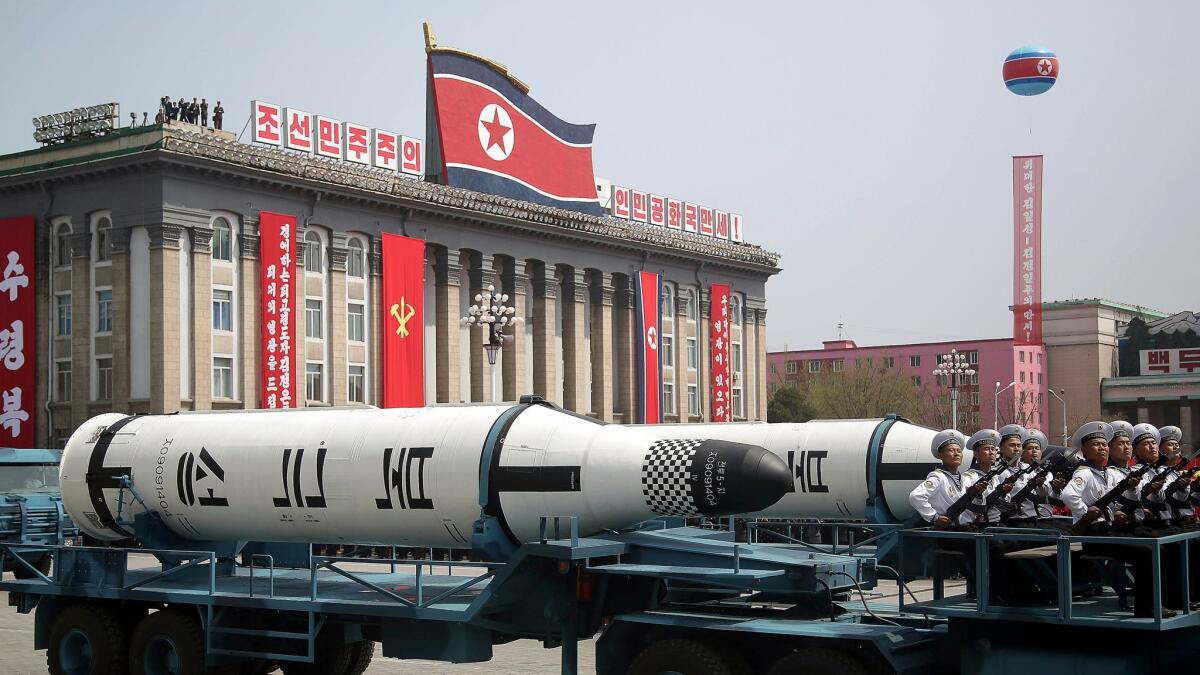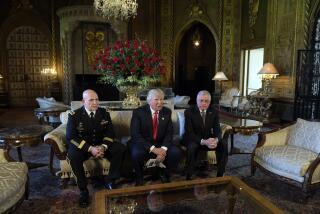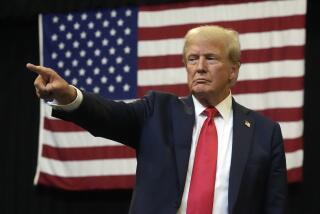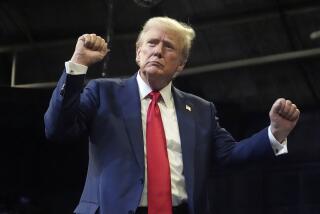Editorial: Campaign bluster won’t work with North Korea. Can Trump learn in time to avert disaster?

The world is on the brink of danger once again, with North Korea threatening further nuclear tests and new missile launches, and the United States drawing red lines and issuing warnings. In recent days, both Vice President Mike Pence and Secretary of State Rex Tillerson have said that American “strategic patience” had come to an end. On Monday President Trump told reporters that North Korea “has gotta behave,” and Pence later cautioned the country not to “test” Trump’s “resolve.” China last week warned of “storm clouds gathering” and described the U.S., North Korea and South Korea as having their “swords drawn and bows bent.” A fleet of American warships was sent to the Korean coast.
These are the moments when steady leadership, careful analysis, wisdom and experience are of paramount importance. But instead we have in the White House a president with no experience and a short attention span, who thus far has shown a tendency toward glib solutions and demagogic bluster. An impulsive man who, if the stories after the recent strike on Syria are to be believed, will make decisions based on emotion and sad photos rather than a careful assessment of risks and rewards.
Luckily for him and for the rest of us, an immediate crisis was averted over the weekend when North Korea’s reckless effort to test launch a ballistic missile from a submarine base on its coast failed. But Kim Jong Un is certainly not going away, and a new nuclear test may come any day. In the weeks ahead, Trump’s aides and confidantes must not take their lead from the president’s bombast, but must lead him toward rational decision-making. They must impress upon him the importance of taking action — or even threatening action — only when he has a sophisticated understanding of the potential costs and benefits, of the likely responses to American behavior and of the preferred endgame. He must also be reminded of the importance of consultation — with advisers, with allies, and with regional powers like China.
Kim Jong Un is certainly not going away, and a new nuclear test may come any day.
Call it the education of Donald Trump. It’s worth a try. Last week, for instance, he described a minor epiphany, telling the Wall Street Journal about a discussion he had recently with Chinese President Xi Jinping about North Korea. “After listening for 10 minutes, I realized it’s not so easy,” he said. “It’s not what you would think.”
While it’s certainly both bizarre and troubling that he thought such issues would be “easy,” it’s mildly encouraging that he is acknowledging his mistake.
Because foreign policy is indeed complicated. It’s one thing to sound decisive and resolute on the campaign trail, but in real-world crises, the stakes are usually extremely high and the options unsatisfying. Consider Syria, for instance, where the Obama administration was unwilling to leave the region alone to work out its problems — or to become much more deeply involved in what could turn into another quagmire like the ones in Iraq, Libya or Afghanistan. Instead, American has remained half in, half out while 400,000 Syrians have died.
In the case of North Korea, the options are also limited and imperfect. There is a good argument that only diplomacy — bolstered by good-faith assistance from China, which has significant influence with North Korea — can pull that reclusive and impoverished country back from the nuclear brink without risking dangerous escalation, including potential attacks on South Korea or even, in the future, the United States. But there is also a case to be made that the endless search for a diplomatic solution has allowed North Korea to march steadily closer to the day when it can perfect and weaponize its long-range missiles, and that a tougher approach is necessary.
The Times generally leans more toward the former approach than the latter. But whichever way the new administration goes, it must do so cautiously and thoughtfully.
So far, the Trump administration has made no serious mistakes with regard to North Korea. Though its rhetoric is growing more belligerent, teetering on the edge of intemperance, no damage has been done.
In the years ahead, North Korea will continue to challenge American policymakers. As will Syria, Russia, China, Ukraine, Israel, Pakistan, Turkey and other countries. We hope our president can learn, and do so in a hurry.
Follow the Opinion section on Twitter @latimesopinion and Facebook
More to Read
A cure for the common opinion
Get thought-provoking perspectives with our weekly newsletter.
You may occasionally receive promotional content from the Los Angeles Times.










